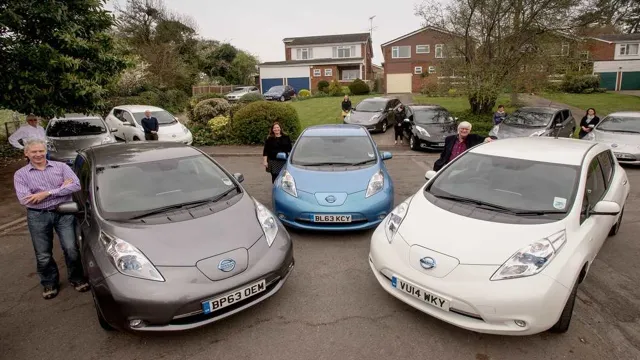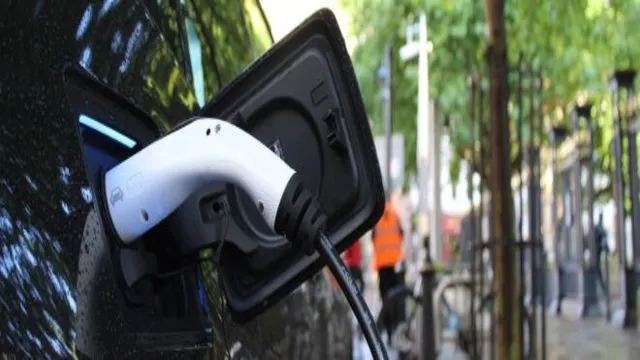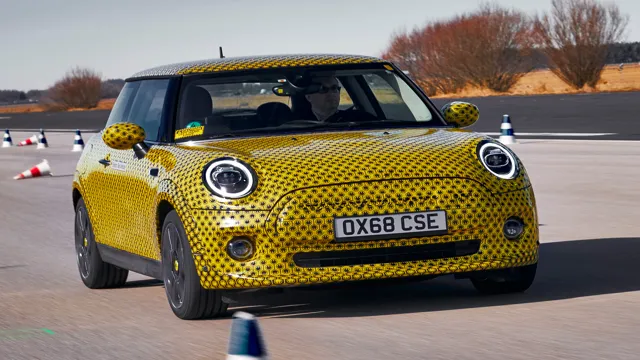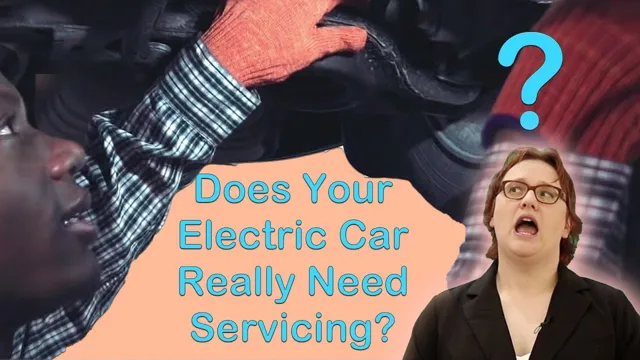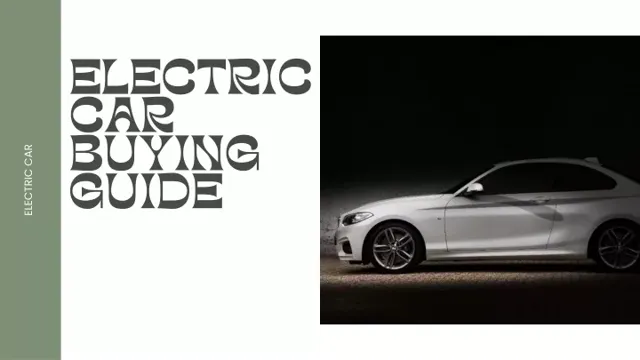Electric Car Heaven: Your Ultimate Guide to Buying a Used Electric Car!
Are you in the market for a new car and considering an electric vehicle (EV)? That’s a smart move! Not only do EVs save you money on fuel costs, but they’re also environmentally friendly. However, buying a used electric car can come with some challenges if you’re not familiar with what to look for. But fear not! This guide will walk you through everything you need to know before making the purchase.
From battery health to charging habits, we’ve got you covered. So, buckle up and let’s dive into the world of used electric car buying.
Why Buy Used?
If you’re in the market for an electric vehicle, buying used could be a smart choice. Not only do they typically come at a lower price point than their new counterparts, but used EVs also offer a reduced carbon footprint by giving a second life to an already manufactured vehicle. However, it’s crucial to do your research and consider the vehicle’s age, battery health, and overall condition before making a purchase.
When considering a used electric car, it’s essential to factor in the potential savings on fuel and maintenance costs, as electric vehicles require fewer repairs compared to traditional gas-powered cars. Overall, a used electric car buying guide could help you make an informed decision, taking into account not just your budget but also your impact on the environment.
Affordability
Affordability If you are looking for a reliable and cost-effective option, buying used cars should be considered. There are many reasons why buying a used car is affordable compared to purchasing a brand new one. For one, the price of a brand new car immediately drops as soon as you drive it off the lot.
That means that you can avoid the high costs associated with first-year depreciation by going for a used car. Furthermore, used cars typically have lower insurance premiums, which can save you a lot of money in the long run. Additionally, used car buyers may also have access to a wider range of financing options, including lower interest rates, which can make the buying process more affordable.
At the same time, buying used doesn’t mean sacrificing quality. Many used cars on the market are in excellent condition and offer great value for money. With a little bit of research, you can find a pre-owned vehicle that meets your needs and fits your budget.
So, if you want to save money and get on the road with a reliable vehicle, buying used is the way to go.
Less Depreciation
Buying used cars can be beneficial in various ways, and one of the most significant advantages is less depreciation. Unlike a new car, a used car has already gone through the initial stage of depreciation, where the value of the car drops dramatically. Therefore, the rate of depreciation significantly decreases, and you will not lose as much money on the resale value of the car.
This means that you can enjoy the car for a while and resell it at a higher price compared to a new car. Not only that, but buying a used car means you avoid the upfront cost of a new car, which can be substantial and result in you paying more in financing and interest rates. When you buy a used car, you are getting a reliable vehicle that will serve you just as well, and by choosing the right used car, you can save yourself a lot of money in the long run.
So,next time you consider buying a new car, research the options available to you for used cars; you may be surprised at how much you can save!
Lower Insurance Rates
Buying a used car can save you a lot of money in insurance fees. This is because many insurance companies will charge a higher premium for a newer car due to the higher cost of replacement parts and repairs. On the other hand, used cars have already experienced some depreciation, which means that they are generally cheaper to insure.
Additionally, if the used car has a strong safety record and is not too expensive to repair, you may be able to save even more money on your insurance premiums. So, if you are looking to save money and get a great deal on your next car, consider buying used. Not only will you save on insurance rates, but you may also be able to get a lower purchase price and avoid the steep depreciation that comes with buying new.
Researching Models
When it comes to buying a used electric car, there are many factors to consider before making a purchase. One of the most important factors is deciding on the right model. Researching different electric car models is crucial because it can help you narrow down your options based on your needs and budget.
Not all electric cars are created equal, so it’s important to take the time to evaluate key features such as range, battery life, charging times, and safety ratings. Some popular electric car models include the Nissan Leaf, Tesla Model S, Chevy Bolt, and BMW i Additionally, the age of the car and its previous usage are important factors to consider, as they can affect the car’s performance and resale value.
Overall, thorough research can help you make an informed decision when buying a used electric car, ensuring that you choose the right model for your needs.
Range and Battery Capacity
When researching electric car models, two important factors to consider are the range and battery capacity. Range is the distance that the car can travel on a single charge, while battery capacity refers to the amount of energy stored in the battery. These factors are closely related and can greatly impact the performance and usability of a electric car.
For those with longer commutes or who frequently travel long distances, a car with a longer range may be a better option. It’s important to note that range can vary depending on a number of factors, including driving habits, weather conditions, and speed. Battery capacity, on the other hand, can affect how quickly a car can be charged and the overall lifespan of the battery.
When comparing different models, it’s important to look at the estimated range and battery capacity to ensure that the car will meet your needs. Some car manufacturers also offer different battery options that can provide longer ranges or faster charging times, so it’s worth doing research to find the best fit for your lifestyle. Overall, range and battery capacity are important factors to consider when looking at electric car models and should be carefully evaluated before making a purchase.
Charging Network Availability
When it comes to choosing an electric vehicle (EV), one major concern people have is the availability of charging networks. Researching different models is an essential step in identifying which EV will meet your driving needs and have the necessary charging infrastructure. Some models have a larger battery capacity and require less frequent charging, while others have quicker charging capabilities.
Additionally, some automakers offer exclusive access to their branded charging network, which can be a significant advantage for their customers. It’s important to consider your local area’s charging network when choosing an EV, as not all charging stations are created equal. Factors like charging speed, availability, and location should be factored in.
By doing careful research into different models and charging networks, you can ensure that your EV driving experience is as convenient and efficient as possible.
Safety Ratings
When shopping for a new car, safety should be a top priority. Fortunately, there are a variety of resources available to help consumers research the safety ratings of different models. One of the most reliable sources is the National Highway Traffic Safety Administration (NHTSA), which rates vehicles on a five-star scale based on their performance in crash tests.
Another resource is the Insurance Institute for Highway Safety (IIHS), which conducts a variety of tests and evaluates the effectiveness of safety features like airbags and auto braking systems. When researching safety ratings, it’s important to look beyond just the overall score and also consider the specific performance of the vehicle in different crash scenarios. Additionally, keep in mind that safety ratings can vary between different trims and options within the same model, so be sure to evaluate the specific version of the car you’re considering.
Ultimately, investing in a vehicle with a high safety rating can provide valuable peace of mind for you and your passengers on the road.
Inspecting the Car
When inspecting a used electric car, there are a few important things to keep in mind. First, take a good look at the exterior to make sure there aren’t any major dents, scratches, or rust. Consider bringing a magnet to check for any hidden body filler, a sign that the car may have been in an accident.
Next, don’t forget to check the tires for wear and tear – since electric vehicles can be heavy due to their battery packs, worn tires can be a safety hazard. When you get inside the car, test all the electronics to make sure everything is functioning properly. This includes the windows, door locks, and sound system, as well as the dashboard – no warning lights should be illuminated.
Lastly, take the car for a test drive to see how it handles on the road. Pay attention to any strange noises, vibrations, or steering issues. With these tips in mind, you’ll be well on your way to finding a used electric car that’s right for you.
Battery Health
When it comes to inspecting an electric car, it is important not to overlook the health of the battery. After all, the battery is what powers the vehicle, so ensuring that it is in good condition is key to maximizing the car’s overall performance. One way to check the battery health is to look at the charging history and see if there are any irregularities or patterns.
Additionally, paying attention to the range of the car is important, as a lower range can indicate diminished battery health. It is also recommended to periodically check the battery temperature, as extreme temperatures can take a toll on the battery’s lifespan. By regularly inspecting the battery and addressing any issues as they arise, drivers can help ensure that their electric car continues to run smoothly.
Mechanical Inspection
When purchasing a used car, it is essential to inspect it thoroughly before making a final decision. An important aspect of vehicle inspection is the mechanical inspection, which involves checking the car’s mechanical systems to ensure they are in good working condition. During a mechanical inspection, the brakes, suspension, engine, transmission, and other components are thoroughly inspected by a qualified mechanic.
Any observed issues are documented, and the mechanic can provide an estimate of the cost and time to repair them. This information is crucial to negotiations with the seller and can be used to determine the car’s fair market value. A mechanical inspection is a small investment that can save you money in the long run by identifying potential problems before you buy the car.
So, if you’re in the market for a used car, don’t forget to include mechanical inspection in your list of things to do. Trust me; it’s worth it.
Test Driving the Car
Now that you’ve found the right used electric car to buy, it’s time to take it for a test drive. This is an important step in the process of purchasing a used electric car. The first thing you want to do when test driving a used electric car is to make sure the battery is fully charged.
The battery should be able to handle the demands of your driving needs. This means that you should test drive the car under different driving conditions, such as on the highway and in stop-and-go traffic. During the test drive, pay attention to the sound the car makes.
Electric cars are quieter than traditional cars, so any unusual noises could be a red flag. It’s also a good idea to test the acceleration of the car, as well as the regenerative braking system. Overall, the test drive should give you a good idea of whether the used electric car is right for you.
Conclusion
In conclusion, purchasing a used electric car can be an eco-friendly and financially savvy decision. By doing your research and following this guide, you can ensure that you find a reliable and cost-effective vehicle that fits your needs. So, whether you’re a Tree hugger or a penny pincher, there’s never been a better time to go electric and drive towards a cleaner, greener future.
Happy shopping!”
FAQs
What should I look for when buying a used electric car?
When buying a used electric car, you should look for the battery health, service history, and any damage or modifications to the car.
How much should I expect to pay for a used electric car?
The cost of a used electric car will vary depending on factors such as the make and model, age, mileage, and condition. Do research and compare prices to find a fair deal.
Can I get a government incentive for buying a used electric car?
In some countries, there are government incentives for buying a new electric car, but few offer incentives for used electric cars. Check with your local government for any available incentives.
What are the benefits of buying a used electric car?
Buying a used electric car can be a more affordable option than buying a new one. Additionally, you’ll benefit from lower fuel costs, a quieter and smoother driving experience, and reduced carbon emissions.

